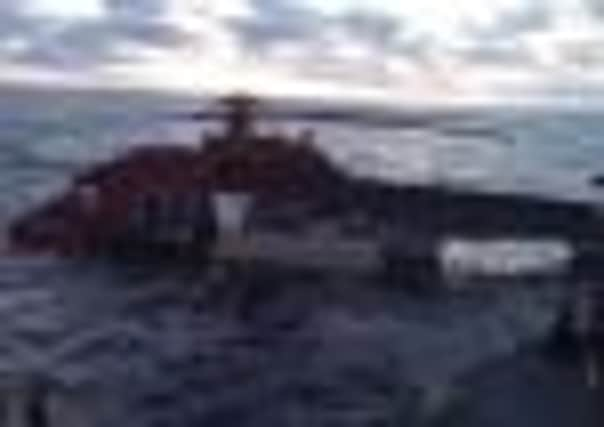Oil workers face disruption as Super Puma EC225 helicopter fleet grounded until February


• Aircraft maker says helicopters won’t fly until they are “110% satisfied”
• Firm says fixing fleet is highest priority company has
Eurocopter, the French manufacturer of the Super Puma EC225, which has been involved in two ditchings since May, revealed yesterday that normal crew-change flights involving the workhorse of the North Sea are unlikely to resume until at least February.
Advertisement
Hide AdAdvertisement
Hide AdLutz Bertling, the company’s chief executive, announced the continued delay in resuming flight operations in Aberdeen following a face-to-face meeting with members of the oil industry’s helicopter steering group to discuss the offshore travel crisis.
All 16 EC225s operating in the North Sea – one-fifth of the entire fleet – have been grounded since 22 October when a CHC-operated Super Puma EC225 was forced to ditch off Shetland. Another Super Puma EC225 ditched 30 miles off the coast of Aberdeen in May.
Both ditchings have led to the discovery of “potentially catastrophic” mechanical failures in the gearbox – identical cracks near a weld in the main vertical gear shaft. In both cases, tests have shown identical problems which resulted in a false alarm being issued over a lubrication system failure. Mr Bertling said yesterday that the aircraft would not be allowed to take to the skies again over the North Sea until the company was “110 per cent” satisfied that it had identified the root cause of the two problems and found a solution to both of them.
The two faults, he stressed, were “completely dislinked – two separate problems”.
He explained: “I felt the need to come here as CEO of Eurocopter because of the lack of confidence which is existing today in our product and because we recognise the impact the issue has had on the passengers, the crews and the oil and gas companies. It is our responsibility to fix it.
“We will bring the aircraft back into service without any rush or compromise on safety. We will not come back to the oil companies and to the passengers and the crews without having a solution where we are
110 per cent convinced that the safety level which we have
certified for the aircraft is fully restored.”
The company, he said, needed to clearly identify the root cause of both faults and to define the “final fix” to correct them.
He continued: “As much as we dislike it, most likely the current inconvenience will continue for some time. The best guess we have at the moment is that the aircraft will come back into operation around February.”
Advertisement
Hide AdAdvertisement
Hide AdLes Linklater, chairman of the oil industry’s helicopter steering group, admitted that the lengthy suspension of flights would mean continued disruption.
He said: “Our priority has to be safety. We appreciate that people are being disrupted and we appreciate that we are moving into a time when people want to be home with their families. But we don’t want to compromise on safety for the sake of that.
“Oil and Gas UK are working really hard with the helicopter operators and production companies to minimise the disruption.”
Jake Molloy, the offshore organiser of the RMT union, said: “I think today’s meeting was open, transparent and informative. It was a positive meeting and everybody is satisfied that the helicopters will remain on the ground until a solution is found.”